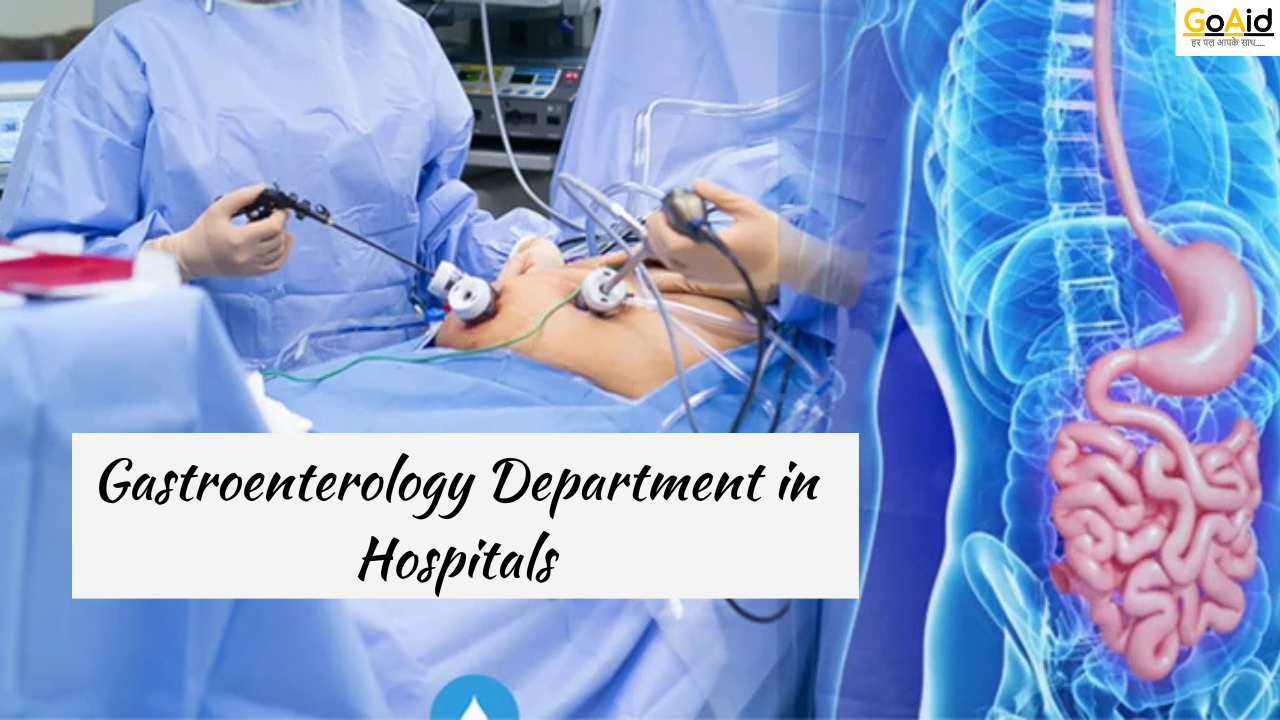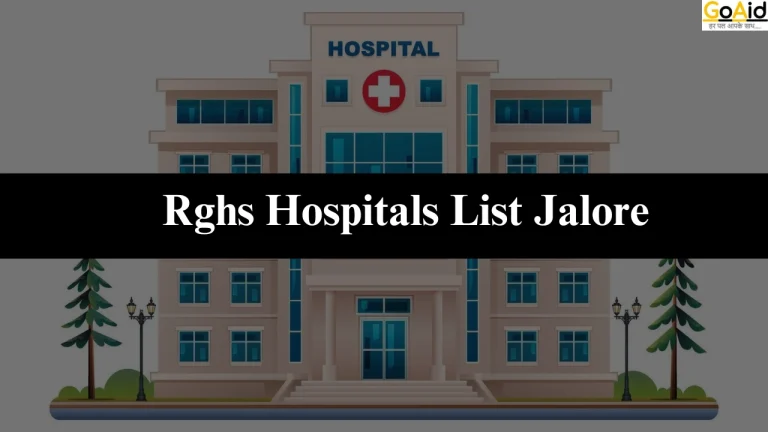If you have ever visited any hospital then you must have noticed the Gastroenterology department in the hospital. However, not all hospitals usually have this department but you can find the Gastroenterology department in any famous hospital in your city. If you have no idea what Gastroenterology means and what is Gastroenterology department in Hospitals is, then no need to worry about it! Because we have simplified this educational journey for you.
In this blog, we have added a comprehensive detail about the Gastroenterology department in the Hospital. We have provided you with details about what the is Gastroenterology department. Its roles and responsibilities, its features and specialties, treatment provided under the Gastroenterology department, essential equipment used in this department & also how can you choose the best Gastroenterology hospitals in India.
So, let’s start-
Complete Guide to the Gastroenterology Department in Hospital
This is a comprehensive detail about the Gastroenterology Department in the Hospital. After reading this blog, you don’t need to read any other blog or article about the Gastroenterology Department to get all the information about it.
What is the Gastroenterology Department in the Hospital? – What does Gastroenterology mean?
The Gastroenterology department in a hospital is a specialized unit focused on diagnosing and treating disorders of the digestive system. The Department of Gastroenterology provides comprehensive care through various Gastroenterology Services in the Hospital, including consultations, diagnostic procedures, and therapeutic interventions.
What does Gastroenterology mean?
Commonly performed Gastroenterology tests help identify issues such as inflammatory bowel disease, liver disorders, and gastrointestinal cancers. The Gastroenterology ward is equipped with essential facilities to ensure effective treatment and patient comfort.
Roles and Responsibilities in Gastroenterology Department in Hospitals
These are the key roles and responsibilities of this department:
1. Patient Assessment
The primary responsibility involves evaluating patients’ medical histories and symptoms related to gastrointestinal issues. This assessment is crucial for determining the appropriate diagnostic tests and subsequent Gastroenterology treatment.
2. Conducting Gastroenterology Tests
Specialists perform various Gastroenterology significant tests, such as endoscopies and colonoscopies, to diagnose conditions. These tests are essential for identifying diseases early and tailoring treatment plans accordingly.
Read More: Dermatology Department in Hospitals
3. Developing Treatment Plans
Based on test results, the Gastroenterology department formulates personalized Gastroenterology treatment plans. This includes medication management, dietary recommendations, and sometimes surgical interventions to address patients’ specific needs.
4. Providing Patient Education
Educating patients about their conditions and treatment options is vital. The department ensures that individuals understand their diagnoses, potential complications, and the importance of treatment adherence.
5. Coordinating Care with Other Departments
The Gastroenterology department in hospitals collaborates with other specialties, such as oncology or surgery, to provide comprehensive care. This interdisciplinary approach ensures all aspects of a patient’s health are addressed.
6. Monitoring Treatment Outcomes
Continuous evaluation of treatment effectiveness is crucial. The Gastroenterology departments track patients’ progress and modify treatment plans based on response and side effects to ensure optimal outcomes.
7. Managing Emergency Cases
Gastroenterology specialists are trained to handle urgent situations like gastrointestinal bleeding or acute abdominal pain. Prompt intervention in these cases is critical for preventing severe complications.
Know More: Top 10 Neurologists in Jaipur
8. Research and Clinical Trials
Engaging in research activities, the Department of Gastroenterology contributes to advancing knowledge in digestive health. Participation in clinical trials helps in the development of new therapies and treatments.
9. Maintaining Equipment and Technology
Ensuring that essential equipment in the Gastroenterology ward is well-maintained and up-to-date is crucial. This responsibility supports accurate diagnostics and safe procedures, enhancing patient care quality.
10. Providing Support and Counseling
Beyond physical health, the Gastroenterology department offers emotional support to patients dealing with chronic conditions. Counseling services help patients manage anxiety and improve their overall quality of life.
Read More: Equipment Essentials: What You Should Expect from a Dead Body Transport Provider
Features and Specialities of the Gastroenterology Department
These are the key features and specialties of Gastroenterology Departments in Hospitals:
1. Advanced Diagnostic Tools
The Gastroenterology department utilizes state-of-the-art diagnostic equipment, including endoscopes and imaging technologies, to conduct thorough Gastroenterology significant tests for accurate diagnosis of gastrointestinal disorders.
2. Specialized Medical Team
A multidisciplinary team, including gastroenterologists, nurses, and dietitians, works collaboratively in the Department of Gastroenterology to provide comprehensive care tailored to each patient’s needs.
Know More: Top 10 Ambulance Service in Bangalore
3. Minimally Invasive Procedures
The Gastroenterology departments often employ minimally invasive techniques for procedures such as endoscopic mucosal resection, which reduces recovery time and minimizes complications for patients undergoing Gastroenterology treatment.
4. Personalized Treatment Plans
Each patient receives a customized approach to their care, with treatment plans developed based on individual health conditions, preferences, and the results of Gastroenterology tests.
5. Integrated Care Services
The Gastroenterology Services in the Hospital extend beyond diagnosis and treatment, encompassing nutrition counseling and psychological support to address the holistic needs of patients.
6. Focus on Preventive Care
The Gastroenterology department in hospitals emphasizes preventive measures, including screenings and patient education, to reduce the risk of developing serious gastrointestinal diseases.
7. Expertise in Chronic Conditions
The department specializes in managing chronic gastrointestinal conditions such as Crohn’s disease, ulcerative colitis, and irritable bowel syndrome, providing ongoing support and treatment for patients.
Also read: The Challenges of Rural Ambulance Services in India
8. Clinical Research Opportunities
The Gastroenterology department frequently engages in clinical research, offering patients access to innovative treatments and therapies through participation in clinical trials.
9. Comprehensive Post-Care Support
After treatment, the Gastroenterology ward provides extensive follow-up care, ensuring that patients receive necessary support and monitoring to maintain their health and manage any lingering issues.
10. Patient-Centric Environment
The hospital Gastroenterology room and ward are designed with patient comfort in mind, creating a supportive atmosphere that enhances the overall patient experience during treatment and recovery.
What treatment is provided in the Gastroenterology Department?
These types of treatment a patient usually gets in the Gastroenterology Department:
1. Medication Management
The Gastroenterology department offers comprehensive Gastroenterology treatment, including prescription medications to manage conditions like acid reflux, inflammatory bowel disease, and liver disorders.
Know More: Choose Best Ambulance Services From Delhi to outstations
2. Endoscopic Procedures
Specialized procedures such as upper endoscopies and colonoscopies are performed within the Gastroenterology departments to diagnose and treat various gastrointestinal issues, providing vital insights into patients’ health.
3. Nutritional Therapy
The Department of Gastroenterology provides personalized dietary plans and nutritional counseling to help patients manage conditions such as celiac disease and irritable bowel syndrome, addressing the meaning of Gastroenterology in holistic care.
4. Surgical Interventions
For patients requiring surgical solutions, the Gastroenterology department in hospitals offers minimally invasive surgeries, such as laparoscopic cholecystectomy, to treat gallbladder and other digestive system disorders.
5. Screening for Colorectal Cancer
Regular screenings are part of preventive care in the Gastroenterology Services in Hospitals, ensuring early detection of colorectal cancer through effective Gastroenterology tests like colonoscopy.
6. Management of Liver Diseases
The department specializes in diagnosing and treating liver-related conditions, including hepatitis and cirrhosis, as part of its extensive Gastroenterology treatment offerings.
Also Read: Complete Guide to the Cardiology Department in Hospitals | Roles, Types, Diseases Treated & Doctors
7. Treatment of Inflammatory Bowel Disease
Patients with Crohn’s disease or ulcerative colitis receive tailored treatment plans involving medications and lifestyle adjustments to manage symptoms effectively within the Gastroenterology ward.
8. Biofeedback Therapy
This innovative therapy is utilized in the Gastroenterology departments to help patients with functional gastrointestinal disorders learn how to control bodily functions and reduce symptoms.
9. Psychological Support
The Gastroenterology department acknowledges the psychological impact of chronic digestive diseases and offers counseling services to help patients cope with anxiety and stress related to their conditions.
10. Clinical Trials Participation
Patients in the hospital Gastroenterology room may have the opportunity to participate in clinical trials, providing access to cutting-edge treatments and therapies that are not widely available.
11. Palliative Care Services
The department provides palliative care to patients with advanced gastrointestinal diseases, focusing on improving quality of life and managing symptoms effectively.
12. Post-Operative Care
After surgeries performed in the Gastroenterology ward in hospitals, patients receive comprehensive follow-up care to monitor recovery and manage any complications that may arise.
13. Telehealth Services
Increasingly, the Gastroenterology departments are offering telehealth services, allowing patients to consult with specialists remotely for convenience and accessibility.
Know More: Difference Between OPD And IPD: Comprehensive Guide
14. Patient Education Programs
The Department of Gastroenterology conducts educational sessions to inform patients about their conditions, treatment options, and preventive measures, enhancing their understanding and engagement in their care.
15. Management of Gastroesophageal Reflux Disease (GERD)
The department provides targeted treatments for GERD, including lifestyle modification guidance, medication, and, in severe cases, surgical interventions, emphasizing the diverse scope of Gastroenterology treatment.
Essential Equipment used in the Gastroenterology Department
These are some of the major types of equipment which generally used in the Gastroenterology Department.
1. Endoscope
An endoscope is a flexible tube equipped with a light and camera, allowing gastroenterologists to visualize the interior of the gastrointestinal tract. It is essential for performing procedures like upper endoscopies and colonoscopies to diagnose and treat various conditions.
2. Colonoscope
A specialized type of endoscope, the colonoscope is specifically designed for examining the colon. It is used during colonoscopies to detect abnormalities such as polyps, tumors, and signs of inflammatory bowel disease.
3. Ultrasound Machine
This imaging equipment uses sound waves to create images of the abdominal organs, aiding in the diagnosis of liver diseases, gallstones, and other gastrointestinal conditions without the need for invasive procedures.
Know More: The Essential Role of Emergency Ambulance Services in Public Health
4. CT Scanner
Computed tomography (CT) scanners provide detailed cross-sectional images of the abdomen, allowing for a comprehensive evaluation of complex gastrointestinal issues and assisting in the planning of surgical interventions.
5. MRI Scanner
Magnetic resonance imaging (MRI) is utilized to obtain high-resolution images of soft tissues, including the liver and pancreas, facilitating the diagnosis of tumors and other abnormalities in the digestive system.
6. X-ray Machine
X-rays are commonly used to assess the gastrointestinal tract’s structure and function. They help diagnose conditions such as bowel obstructions or perforations and are often used in conjunction with barium studies.
7. pH Monitoring System
This device measures the acidity levels in the esophagus, aiding in the diagnosis of gastroesophageal reflux disease (GERD). It provides valuable data for developing appropriate treatment plans.
8. Biopsy Forceps
Used during endoscopic procedures, biopsy forceps enable gastroenterologists to obtain tissue samples from the gastrointestinal tract. These samples are crucial for diagnosing conditions such as cancer and inflammatory diseases.
9. Surgical Instruments
A variety of surgical instruments, including scalpels, scissors, and clamps, are essential for performing surgical interventions in the Gastroenterology department, such as laparoscopic surgeries for gallbladder removal or bowel resections.
REad more: 108 EMERGENCY AMBULANCE NUMBER
10. Infusion Pumps
These devices are used for administering medications and fluids to patients, especially those undergoing treatments for chronic gastrointestinal diseases or post-operative care, ensuring precise dosages and patient comfort.
How to Choose the Best Gastroenterology Hospital in India?
You can consider the following points as guiding points for choosing the best Gastroenterology Hospital in India:
1. Research Hospital Reputation
Investigate the reputation of various Gastroenterology departments within hospitals by checking online reviews and patient testimonials. A well-regarded hospital is more likely to provide high-quality Gastroenterology Services in Hospital.
2. Check for Accreditation
Ensure the Department of Gastroenterology is accredited by recognized health organizations. Accreditation is a mark of quality and indicates that the hospital meets established standards for patient care.
3. Evaluate the Medical Team
Look for hospitals with experienced gastroenterologists who specialize in medical Gastroenterology. Research their qualifications, expertise, and success rates in performing procedures related to gastrointestinal health.
Know More: Cost of ICU Ambulance In India
4. Consider the Range of Services Offered
A comprehensive Gastroenterology department in hospitals should provide a wide array of services, including diagnostic tests, medical treatments, and surgical interventions, catering to various gastrointestinal conditions.
5. Availability of Advanced Technology
Ensure the hospital is equipped with the latest diagnostic and therapeutic equipment, such as endoscopes and imaging machines, which are essential for effective diagnosis and treatment in Gastroenterology departments.
6. Examine Patient Care Facilities
Assess the quality of patient care facilities in the Gastroenterology ward. Comfortable accommodations, attentive staff, and support services are vital for a positive treatment experience.
7. Look for a Multidisciplinary Approach
Choose hospitals that promote a multidisciplinary approach to treatment, where gastroenterologists collaborate with dietitians, surgeons, and other specialists to provide comprehensive care tailored to individual patient needs.
8. Assess Post-Treatment Support
Inquire about the hospital’s post-treatment care and follow-up services. Effective post-care is crucial for managing ongoing gastrointestinal health, ensuring that patients receive the necessary support after treatment.
9. Check Insurance Compatibility
Confirm whether the Gastroenterology department accepts your health insurance plan. Financial considerations are important, and many hospitals offer assistance with insurance claims to ease the process for patients.
10. Seek Referrals and Recommendations
Ask for referrals from primary care physicians or other healthcare professionals. They can provide valuable insights into the best Gastroenterology department in hospitals that align with your specific health needs.
Book Ambulance: GoAid Ambulance Service
Conclusion to the Gastroenterology Department
In conclusion, the Gastroenterology department plays a vital role in the healthcare system, providing comprehensive care for patients with a wide range of digestive disorders. Understanding the Gastroenterology meaning and the functions of the department of Gastroenterology is essential for recognizing its significance in diagnosing and treating gastrointestinal conditions.
The Gastroenterology departments are equipped with advanced technology and staffed by skilled specialists who conduct essential Gastroenterology significant tests and deliver tailored Gastroenterology treatment plans.
Furthermore, the collaborative approach within the Gastroenterology Services in the Hospital ensures that patients receive holistic care, addressing both their physical and emotional needs. From routine screenings to complex surgical interventions, the Gastroenterology ward is dedicated to improving patient outcomes and quality of life. Ultimately, the importance of the Gastroenterology department cannot be overstated. If you have any other questions to ask, feel free to write that question in the comment box.
FAQ
Question 1: What is the Gastroenterology department in hospitals?
Answer: The Gastroenterology department in hospitals specializes in diagnosing, treating, and managing disorders related to the digestive system. This includes the stomach, liver, intestines, pancreas, and esophagus. It addresses conditions such as acid reflux, gastrointestinal cancers, liver diseases, IBS, and inflammatory bowel diseases (IBD).
Question 2: What is medical gastroenterology?
Answer: Medical gastroenterology refers to the non-surgical branch of gastroenterology. This branch focuses on the diagnosis, management, and treatment of diseases related to the digestive system. It involves the use of medications, dietary changes, and endoscopic procedures to treat conditions like gastritis, gastroesophageal reflux disease (GERD), irritable bowel syndrome (IBS), and hepatitis.
Question 3: What are the significant tests conducted in the Gastroenterology department?
Answer: In the Gastroenterology department, significant tests include endoscopies (e.g., gastroscopy, colonoscopy), liver function tests, stool tests, CT scans, and biopsy for diagnosing gastrointestinal cancers. Ultrasound and capsule endoscopy are also used to evaluate digestive tract issues.
Question 4: What treatments are offered in the Gastroenterology department?
Answer: The Gastroenterology department offers various treatments. These treatments include medications for acid reflux, biologics for IBD, antibiotics for infections like H. pylori, and endoscopic procedures for removing polyps, treating bleeding ulcers, and dilating strictures. The department may also offer liver transplants for severe liver diseases.
Question 5: What is the meaning of Gastroenterology?
Answer: Gastroenterology is the branch of medicine that focuses on the study, diagnosis, and treatment of diseases related to the digestive system. This includes organs such as the stomach, liver, pancreas, intestines, and colon, as well as conditions like inflammatory bowel disease (IBD), cancer, gallstones, and hepatitis.
Question 6: What is the department of Gastroenterology responsible for?
Answer: The department of Gastroenterology is responsible for diagnosing, treating, and managing a wide range of gastrointestinal disorders. This includes chronic conditions like irritable bowel syndrome (IBS), liver diseases, and pancreatitis, as well as conducting diagnostic procedures such as endoscopies and providing treatments like medications and surgical interventions.
Question 7: What happens in the Gastroenterology department of a hospital?
Answer: In the Gastroenterology department, patients undergo consultations for gastrointestinal problems. These problems include abdominal pain, nausea, vomiting, or digestive issues. The department provides diagnostic procedures like endoscopies, liver function tests, and CT scans to assess the condition. Patients receive personalized treatments, including medications, dietary recommendations, and sometimes surgical interventions.
Question 8: What are the essential equipment found in the Gastroenterology ward of hospitals?
Answer: The Gastroenterology ward in hospitals is equipped with essential tools such as endoscopic machines for procedures like gastroscopy and colonoscopy, ultrasound and CT scanners for imaging, liver function testing kits, and biopsy equipment. These tools help doctors diagnose and treat gastrointestinal disorders effectively.
Question 9: What is the function of the Gastroenterology department in hospitals?
Answer: The function of the Gastroenterology department is to provide specialized care for patients with digestive system disorders. This includes diagnosing gastrointestinal issues through tests like endoscopies, offering medications and lifestyle recommendations, and performing surgical interventions or endoscopic procedures when necessary to treat conditions like stomach ulcers, liver disease, and colon cancer.
Question 10: What is the importance of the Gastroenterology department in a hospital?
Answer: The Gastroenterology department plays a vital role in diagnosing and treating digestive system diseases that can significantly affect a patient’s health and quality of life. The department helps manage chronic conditions like IBS, gallstones, and liver diseases and provides critical care for serious conditions such as gastrointestinal cancer, cirrhosis, and pancreatitis.














